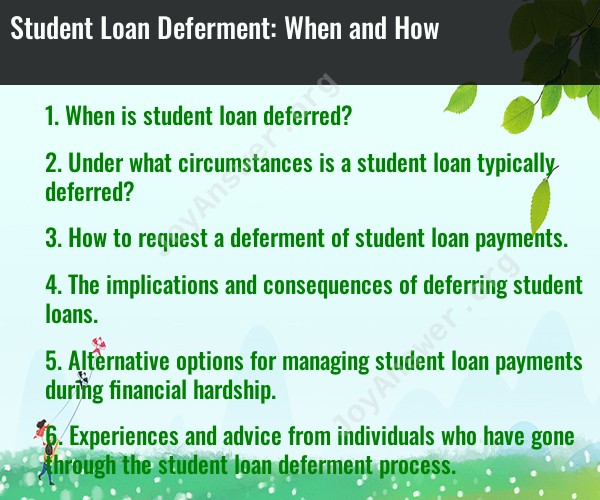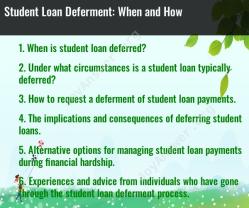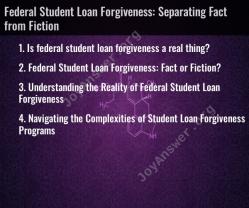When is student loan deferred?
Student loan deferment is a temporary postponement of student loan payments. Deferment is typically granted under specific circumstances, and it allows borrowers to temporarily halt their loan payments without incurring interest during the deferment period. Here are some common situations in which student loan deferment may be granted and the steps to request it:
Common Circumstances for Student Loan Deferment:
In-School Deferment: If you are enrolled in at least half-time at an eligible educational institution, your federal student loans (e.g., Direct Subsidized and Unsubsidized Loans) are automatically placed in an in-school deferment. This means you don't have to make payments while you're in school, and interest does not accrue on subsidized loans.
Unemployment Deferment: If you are unemployed or unable to find full-time employment, you may be eligible for an unemployment deferment on your federal student loans. You can apply for this deferment if you meet specific criteria.
Economic Hardship Deferment: If you are facing economic hardship, such as low income or financial difficulties, you may qualify for an economic hardship deferment on your federal student loans. You need to meet specific income and financial criteria.
Active Duty Military Service: If you are on active duty in the military, you can defer your federal student loans for the duration of your service. This includes service during a war, military operation, or national emergency.
Peace Corps or AmeriCorps Service: Volunteers in the Peace Corps or AmeriCorps can receive deferments during their service periods.
Steps to Request Deferment:
Contact Your Loan Servicer: If you believe you qualify for a deferment, you should contact your loan servicer, the entity responsible for managing your student loan account. Your loan servicer can provide you with the necessary forms and guidance to request deferment.
Complete the Deferment Application: You'll need to complete the deferment application, which typically requires information about your circumstances and any supporting documentation, such as proof of unemployment or military orders.
Submit the Application: Send the completed deferment application and any required documentation to your loan servicer. Make sure to keep copies for your records.
Continue Payments Until Approved: While your deferment application is being processed, continue making payments on your student loans. It's crucial to continue paying until your deferment is approved to avoid late fees or delinquency.
Stay Informed: Keep track of the status of your deferment request and follow up with your loan servicer if necessary. Once approved, you can temporarily stop making payments during the deferment period.
Renew or Extend: Some deferments have time limits, so be aware of the duration of your deferment and reapply if necessary to extend it.
It's important to note that deferment options can vary for federal and private student loans, and the specific requirements and available deferment reasons may differ among loan servicers and lenders. Additionally, deferment does not apply to all types of student loans, so it's crucial to understand the terms of your loans and consult with your loan servicer for personalized guidance on deferment options and eligibility.
Under what circumstances is a student loan typically deferred?
Student loan deferment is a period of time during which a borrower may temporarily postpone making payments on their student loan. Deferment is typically granted in the following circumstances:
- Enrollment in school: Borrowers who are enrolled at least half-time in an eligible college or university may be eligible for an in-school deferment.
- Economic hardship: Borrowers who are experiencing financial hardship may be eligible for a general deferment.
- Unemployment: Borrowers who are unemployed may be eligible for an unemployment deferment.
- Peace Corps or AmeriCorps service: Borrowers who are serving in the Peace Corps or AmeriCorps may be eligible for a deferment.
- Cancer treatment: Borrowers who are undergoing cancer treatment may be eligible for a deferment.
How to request a deferment of student loan payments.
To request a deferment of student loan payments, borrowers must contact their loan servicer. Loan servicers are the companies that manage student loans on behalf of the federal government.
Borrowers will need to provide their loan servicer with documentation to support their request for deferment. This documentation may vary depending on the type of deferment being requested. For example, borrowers requesting an in-school deferment will need to provide their loan servicer with a copy of their enrollment verification form from their school.
The implications and consequences of deferring student loans.
When a borrower defers their student loans, they are not required to make payments during the deferment period. However, interest will continue to accrue on the loan during the deferment period. This means that the borrower's balance will increase during the deferment period.
Borrowers should also be aware that deferring their student loans may extend the term of their loan and increase the total amount they will pay over the life of the loan.
Alternative options for managing student loan payments during financial hardship.
If a borrower is experiencing financial hardship, there are a number of alternative options available for managing their student loan payments. These options include:
- Forbearance: Forbearance is similar to deferment, but it is not granted automatically. Borrowers must request forbearance from their loan servicer.
- Income-driven repayment plans: Income-driven repayment plans cap monthly student loan payments at a percentage of the borrower's income.
- Public Service Loan Forgiveness (PSLF): PSLF is a federal program that forgives the remaining balance of a borrower's student loan after they make 120 qualifying payments while working full-time for a qualified public service employer.
Borrowers who are experiencing financial hardship should contact their loan servicer to discuss their options for managing their student loan payments.
Experiences and advice from individuals who have gone through the student loan deferment process.
Here are some experiences and advice from individuals who have gone through the student loan deferment process:
- "Deferring my student loans was a lifesaver when I lost my job. It allowed me to catch up on my other bills and get back on my feet financially."
- "I was hesitant to defer my student loans because I didn't want my balance to increase. But my loan servicer was able to work with me to create a repayment plan that I could afford."
- "I'm glad I deferred my student loans while I was in school. It allowed me to focus on my studies without having to worry about making payments."
- "If you're considering deferring your student loans, be sure to talk to your loan servicer first. They can help you understand the implications and consequences of deferment and help you create a repayment plan that works for you."
Overall, student loan deferment can be a helpful tool for borrowers who are experiencing financial hardship. However, it is important to weigh the benefits and drawbacks of deferment before making a decision. Borrowers should also talk to their loan servicer to discuss their options for managing their student loan payments.








